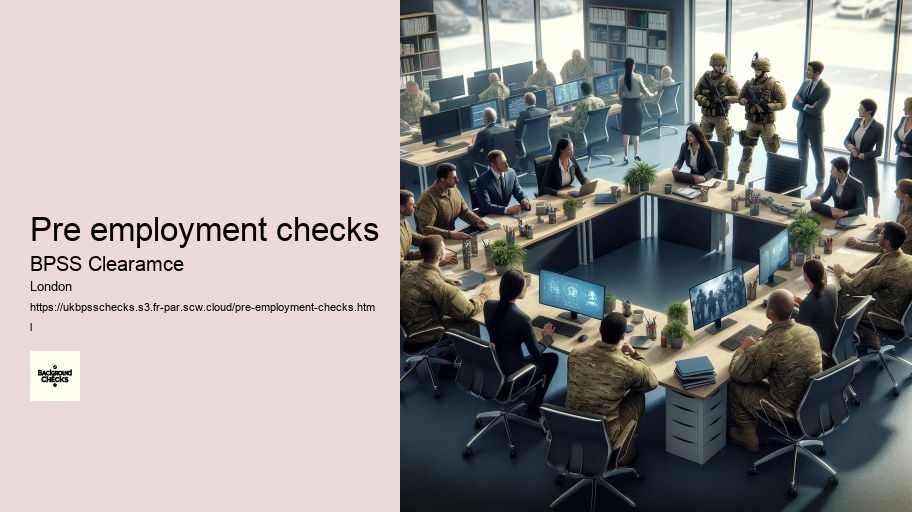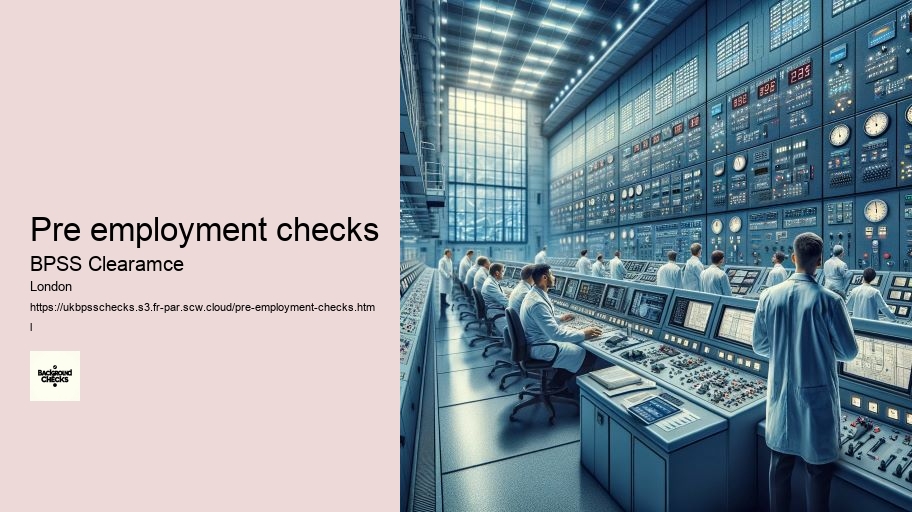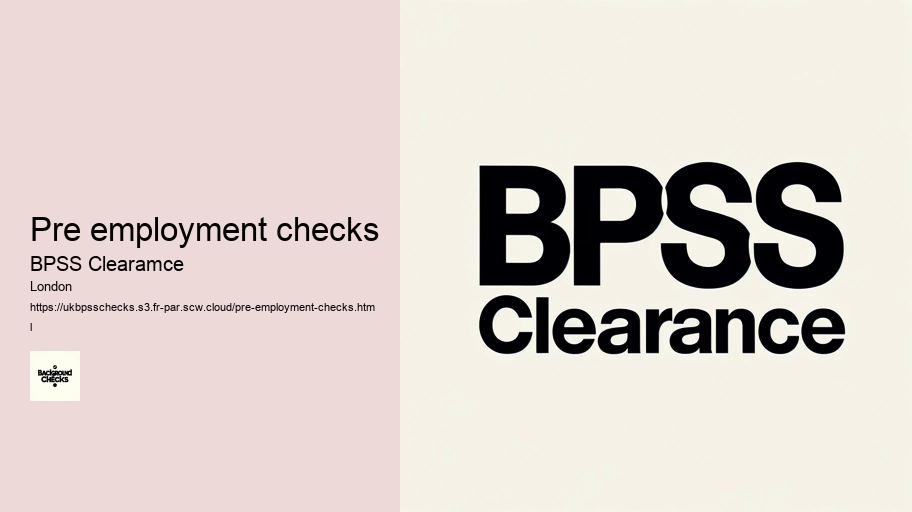
In these sectors, verifying the eligibility and trustworthiness of individuals handling government-related tasks is essential. By mandating BPSS checks for these specific roles and sectors, organizations can maintain secure environments, prevent unauthorized access to data, and enhance trust in their recruitment processes.
Unlike BPSS checks, DBS checks are required for positions involving contact with vulnerable groups, such as in teaching, healthcare, and social services. DBS checks are more detailed and can include checks on spent and unspent convictions, cautions, reprimands, and warnings held in the UK Police records, depending on the level of check required.
Renewal and revalidation of BPSS clearance should be conducted periodically, especially for employees in long-term sensitive roles. This ensures that any changes that might affect an individual's security status are identified and managed effectively, maintaining continuous security compliance.
In conclusion, BPSS clearance is an essential component of the security framework within many organizations, particularly those involved with the UK government or national security. It provides a comprehensive assessment of an individual's suitability for sensitive roles, helping to maintain the integrity and security of crucial operations.
During the BPSS clearance process, individuals must accurately disclose any periods of 6 months or more spent outside the UK in the last 3 years. This requirement aims to evaluate your movements and assess potential risks associated with overseas stays. It's essential to provide precise information about these periods to maintain the credibility and thoroughness of the BPSS clearance process.
Additionally, Security Check (SC) and Counter-Terrorist Check (CTC) clearances offer access to more classified data than BPSS, making them essential for roles with heightened security requirements.

- Any connections or affiliations established overseas should be clearly communicated.
- Complete and submit all required documentation accurately and truthfully.
During the renewal process, you'll need to undergo re-verification of your right to work, identity, criminal records, and employment history to confirm continued eligibility. Failure to renew your BPSS clearance on time can lead to a lapse in access to sensitive information and government assets.
The individual's personal circumstances can also impact the time it takes to complete a BPSS check. For example, individuals who have frequently moved or changed jobs may require more extensive checks on their background, thus extending the process.
The process of conducting BPSS checks is systematic and standardized to ensure consistency and thoroughness.
Therefore, full disclosure and honesty regarding any unspent criminal records are crucial steps in the BPSS application process.


- Providing reasons for extended stays abroad can help clarify your activities during that time.
The role of BPSS clearance in maintaining public trust cannot be overstated. By ensuring that individuals
BPSS clearance is often a prerequisite for obtaining higher levels of security clearance, such as Security Check (SC) or Developed Vetting (DV).
3. **Continuous Monitoring:** Anticipate standard practices of continuous monitoring and periodic re-screening to uphold BPSS compliance over time.
These components collectively contribute to a thorough assessment of an individual's background, aiding organizations in making informed decisions regarding their suitability for roles requiring access to sensitive information.
in sensitive positions are thoroughly vetted, organizations can assure the public that they are taking all necessary steps to safeguard sensitive information and critical infrastructure.

When undertaking BPSS clearance, organizations must verify four main components: identity confirmation, employment history, criminal record, and right to work status. This comprehensive approach ensures that all aspects of an individual's background are scrutinized, providing a holistic view of their suitability for sensitive roles. The thoroughness of BPSS clearance helps prevent any potential security breaches that could arise from incomplete background checks.
In industries where security is paramount, BPSS clearance acts as a first line of defense against potential internal threats. By vetting employees thoroughly before employment, organizations can prevent the exploitation of sensitive positions and protect against security breaches.
The initial stages of a BPSS check involve gathering personal information from the candidate, including identity documents, employment history, and nationality status.
BPSS stands for "Baseline Personnel Security Standard." It's essentially a basic level of security clearance required for individuals working in roles that involve access to sensitive information or facilities, especially in the public sector. The BPSS checks typically include identity verification, employment history checks, and criminal record checks.
No, BPSS (Baseline Personnel Security Standard) and DBS (Disclosure and Barring Service) are not the same.
BPSS (Baseline Personnel Security Standard): This is a set of government guidelines in the United Kingdom for ensuring the security clearance of individuals working with sensitive information or in certain roles. It is a basic level of security clearance and involves checks such as identity verification, employment history, and criminal record checks. BPSS is often required for roles in both the public and private sectors where access to sensitive information or facilities is involved.
DBS (Disclosure and Barring Service): This is a government agency in the UK that performs checks on individuals working with children or vulnerable adults. The DBS conducts criminal record checks (previously known as CRB checks) to help organizations make safer recruitment decisions by identifying candidates who may be unsuitable for certain roles due to past criminal convictions, cautions, reprimands, or warnings.
While both BPSS and DBS involve background checks, they serve different purposes and are used in different contexts. BPSS focuses on security clearance for a broader range of roles, including those involving access to sensitive information, while DBS specifically focuses on roles involving work with vulnerable groups.
The Baseline Personnel Security Standard (BPSS) checks typically include:
Identity Verification: Verifying the identity of the individual through official documents such as passports, driver's licenses, or other government-issued identification.
Employment History Checks: Verifying the individual's employment history to ensure accuracy and assess their suitability for the role.
Criminal Record Checks: Checking for any criminal convictions or cautions. This is often done through a Basic Disclosure from the Disclosure and Barring Service (DBS) in England and Wales, Disclosure Scotland in Scotland, or AccessNI in Northern Ireland.
Verification of Address: Verifying the individual's current and previous addresses to ensure accuracy and completeness of their background information.
These checks are aimed at establishing a baseline level of trustworthiness and suitability for individuals working in roles that require access to sensitive information or facilities, particularly within the public sector but also in some private sector positions.
A valid proof of address for a Baseline Personnel Security Standard (BPSS) check typically includes official documents that clearly display the individual's name and current address. Common examples of acceptable proof of address documents may include:
Utility Bills: Recent bills for services such as electricity, gas, water, or landline phone, issued within the last three to six months.
Bank Statements: Recent bank statements, typically issued within the last three to six months, showing the individual's name and address.
Official Letters: Letters from government agencies, local authorities, or financial institutions, such as tax statements, council tax bills, or letters from the Department for Work and Pensions (DWP), which display the individual's name and address.
Tenancy Agreements: A signed and dated rental or lease agreement for accommodation, showing both the tenant's and landlord's details, along with the property address.
Mortgage Statements: Statements from a mortgage provider showing the individual's name and property address, issued within the last three to six months.
It's important to note that the specific requirements for proof of address may vary depending on the organization conducting the BPSS check. Additionally, the document should be recent and not expired, and it should clearly display both the individual's name and current address.
A Baseline Personnel Security Standard (BPSS) check is typically required for individuals working in roles that involve access to sensitive information or facilities, particularly within the public sector but also in some private sector positions. While specific requirements may vary depending on the organization and the nature of the role, BPSS checks are commonly needed for individuals who:
In summary, individuals who require a BPSS check are those whose roles involve a level of trust, responsibility, and access to information or facilities that necessitate verification of their identity, employment history, and suitability for the position.
The Baseline Personnel Security Standard (BPSS) does not have an expiry date like some other security clearances. Instead, it serves as a foundational level of security clearance that establishes an individual's baseline trustworthiness and suitability for roles requiring access to sensitive information or facilities.
However, while the BPSS itself does not expire, organizations may have their own policies regarding the periodic review or renewal of security clearances for their employees. For instance, some employers may require employees to undergo regular rechecks or refreshes of their background checks, including BPSS checks, to ensure that their security clearance remains up to date.
Therefore, although the BPSS clearance itself doesn't have a fixed duration, individuals and organizations should be aware of any policies or requirements related to maintaining and updating security clearances in accordance with best practices and organizational guidelines.